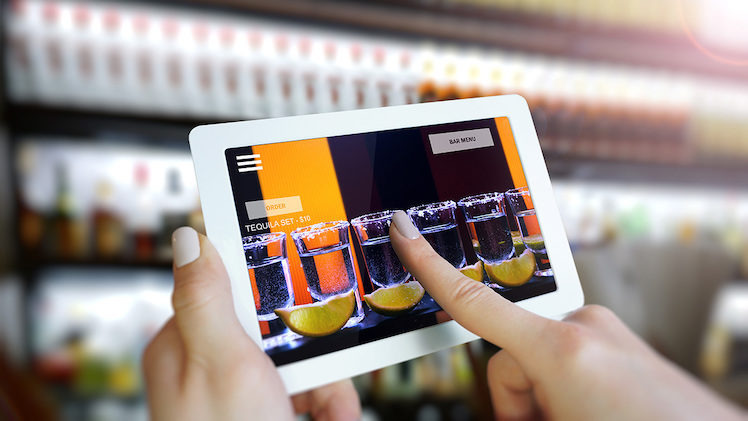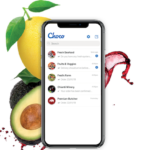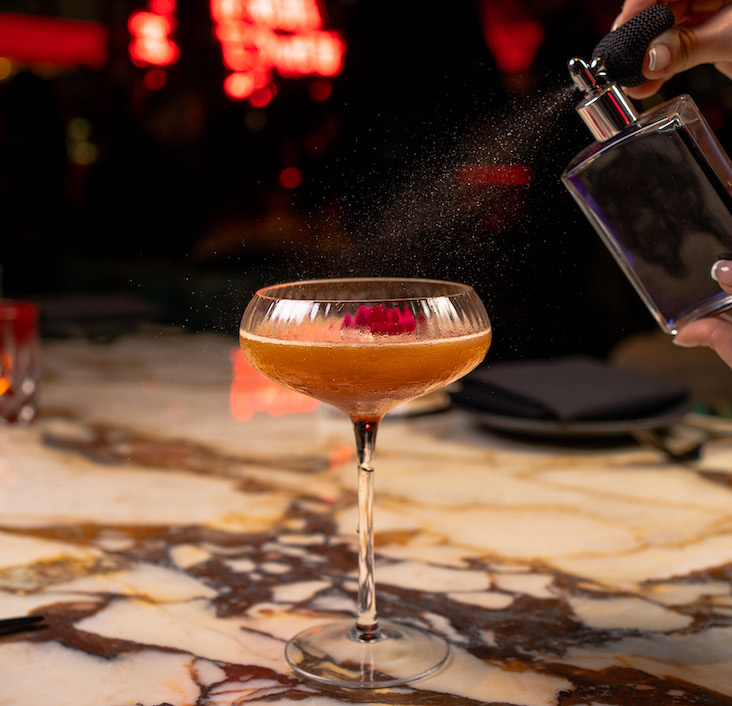Technology has become more important in beverage alcohol in recent years, for both on- and off-premise operators. But the coronavirus pandemic accelerated the push to adopt new tech and tactics, especially as stay-at-home orders brought a surge in restaurant to-go and delivery business.
Whereas restaurant technology previously focused more on business aspects such as point-of-sale and payments, digital menus and signage, full-service operators now seek solutions such as upgraded sanitization systems and products, delivery-route optimization software, new reservation and rewards platform, air purification technology and more.
For instance, HomeState, a three-unit Tex-Mex chain based in Los Angeles, decided to take delivery in-house in mid April after becoming dissatisfied with the third-party delivery providers. The company started slowly, using four employees and two cars purchased for catering, and only offered delivery to customers within one mile of one location.
It’s done well enough that HomeState was expanding the service to other locations. The company is also reportedly considering keeping delivery in-house post-pandemic and looking into software to better manage the logistics.
The eateries opening for dine-in service face a host of restrictions and mandates to comply with social distancing, new hygiene and protection procedures and contactless service. It’s important to make guests feel safe and comfortable so that they enjoy the on-premise experience and come back.
Red Phone Booth, a new speakeasy bar in Nashville, reopened on May 14 after installing new air purification technology. The system uses needlepoint bipolar ionization (NBPI) technology from Global Plasma Solutions that purifies the air by eliminating airborne particulates, odors and pathogens.
The technology attacks and kills viruses, mold spores and bacteria with ions that steal away hydrogen from the pathogens so they die. It helps that Red Phone Booth, which had first opened in December, has an extensive cigar program, so it was up on the latest in air purification.
Revisiting the tech stack
In addition to readjusting dining rooms and contactless everything, Joel Montaniel, CEO of hospitality platform Seven Rooms, sees more restaurant operators revisiting their tech stack. With money tighter than ever, operators should reflect on each platform within their tech stack, and whether each one provides a strong ROI.
Thirty-percent commissions for delivery and $1/cover fees for reservations with little access to customer data will no longer be palatable for operators in a post-COVID world, Montaniel says.
“We will see more restaurants focus on direct delivery and reservation channels that don’t charge commission or per cover fees, and that enables them to own their guest data to provide exceptional experiences inside and outside the dining room.”
Prior to the pandemic, many restaurants had been slow to adopt newer ordering technologies. So when dine-in service was suspended and they could only do takeout business, operators were getting overwhelmed with trying to take orders over the phone if they didn’t have an online ordering system.
Until there is a vaccine for COVD-19, and most likely even after that, much of the restaurant experience will be conducted online, from viewing the menu to ordering and payment.
Many apps are moving quickly to meeting changing restaurant needs. For instance, DineVite, an app designed to help operators fill seats, made its debut at the International Restaurant & Food Service Show in New York in March, just as the pandemic was taking off in the U.S.
DineVite quickly adapted to offer features to ensure diner safety while maximizing table turnover. These include take-away rewards for customers that provide restaurants with scalability to meet their profit margins; restaurant verification of social distancing guidelines; online booking with set arrival time; “How many people are dining at this time” functionality; pre-order of food via online menus and payment via app.
Here are a few of the new and noteworthy tech options for restaurants in light of business changes brought on by the coronavirus.
Bar inventory software solution Backbar offers tools to help increase profitability, manage costs and preserve cash flow, as bars and restaurants work to recover from the impact of Covid-19.
The Clean Hands System from Clean Hands Co. ensures that employees wash their hands on a regular basis. The easy-to-use handwashing compliance tool helps streamline daily operations for management teams.
The EZ-Chow digital customer engagement platform gives restaurant and hospitality companies the ability to integrate its solution in most POS systems. The customizable product can extend POS functionality to reduce labor costs, sync online and onsite menu changes, create a marketing database, and combine sales into one reporting interface.
Consumer-centric commerce platform Freedompay recently announced a Touchless Commerce program, ensuring the safety of merchants and customers globally. Whether in a restaurant, airport, convenience store, retail outlet or hotel, enabling touchless commerce makes the checkout experience swift, simple and secure.
Air purification technology provider Global Plasma Solutions uses needlepoint bipolar ionization (NBPI) technology that purifies the air by eliminating airborne particulates, odors and pathogens. The air filtration technology easily captures the larger particles, increasing the capture efficiency of the air purifiers and HVAC system.
Grubbrr is a payments technology company that works with restaurants and retailers in the U.S. Products include kiosks and contactless ordering technology.
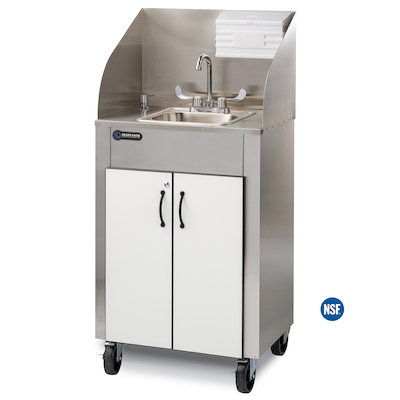
Ozark River Portable Sinks makes portable sinks that are NSF certified and designed to comply with state and local hand-washing codes. The units are self-contained unit, out-of-box ready for use with instant hot and cold portable water with quick-connect water tanks.
Patronscan, a manufacturer of I.D. scanning technology, has developed a contact tracing guest registry that measures occupancy levels and makes contact tracing faster and safer. The technology allows hospitality businesses to quickly process, authenticate and store customer information in compliance with local privacy laws.
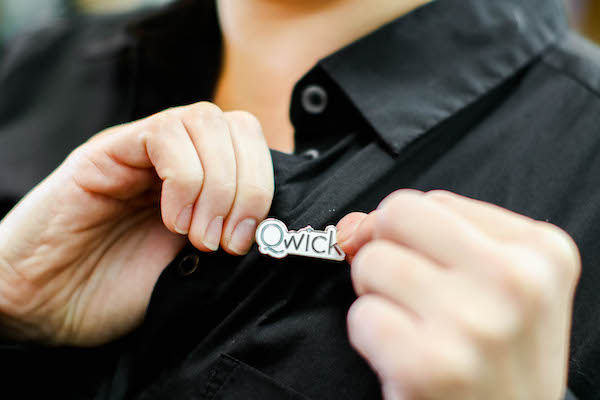
Founded in 2018 by three human resource technology and hospitality industry veterans, Qwick provides a staffing platform for food and beverage professionals to connect directly with grocers, hospitals, hotels, caterers, event venues and restaurants with the freedom and flexibility to work on their own schedules.
RestoLabs provides an ordering system for restaurants to get online and start selling to customers directly. Features include quick menu setup, multilingual support, analytics, order management, marketing tools and dedicated support.
RouteSavvy offers web-based, route-optimization software developed by OnTerra Systems. RouteSavvy, which costs $300 per year for up to three users, helps small business owners generate more efficient routes for deliveries, pick-ups, service and sales calls.
Seven Rooms specializes in integrated web and mobile applications, advanced inventory management capabilities and an auto-assign algorithm to maximize covers and revenue so that operators can more easily manage crowds. The integrated waitlist offers customizable two-way SMS capabilities, connecting directly to guest profiles.
Swipeby is a new app that allows customers to browse menus, order food, pay for it, and have items delivered curbside. It frees the phone-ordering bottleneck, giving restaurants an additional way to take curbside orders at a low cost of entry and with lower ongoing fees than those charged by delivery services like Grubhub and DoorDash.
Zuppler is an online ordering system for restaurants, caterers, groceries, universities, hospitals, hotels, sports stadiums, and delivery services. The online ordering menus integrate with Google, and leading delivery, POS, loyalty and payment providers.

